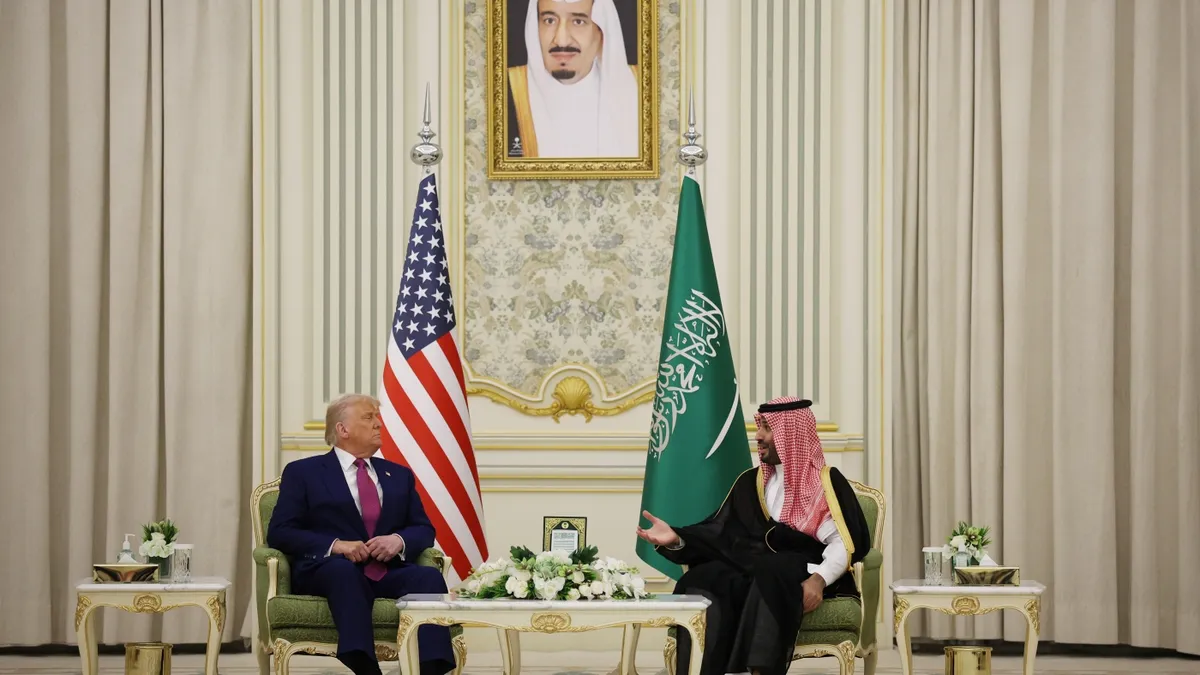
Former President Donald Trump was treated like royalty during his extravagant four-day trip to the Middle East. The visit featured opulent palaces, fighter jet escorts, parades of camels, and a wealth of other luxurious displays that catered to Trump's penchant for a gold-plated lifestyle. His overarching focus, as he claimed, was to secure lucrative deals and investments for the United States. The Gulf states responded enthusiastically, seeking to win favor with the former president through investments, arms agreements, and even purchasing Boeing planes while gifting him a lavish jet. Here are five key takeaways from Trump's trip.
Donald Trump has always valued loyalty, power, and spectacle. Throughout his second term, he has received unwavering loyalty from his staff and Cabinet appointees. His admiration for authoritarian leaders like Viktor Orban of Hungary and Vladimir Putin of Russia is well-documented. Trump frequently indulges in the luxurious surroundings of his Mar-a-Lago estate in Palm Beach, Florida, and he has redecorated the Oval Office with gold accents. During a recent meeting with Canada's new Prime Minister Mark Carney, Trump proudly showed off the redesigned Oval Office, boasting about its beauty enhanced by "great love and 24-karat gold." This trip to the Middle East mirrored that experience, filled with genuflecting leaders and gilded glamour.
Trump's visit resulted in several significant financial agreements between the United States and Gulf nations, including Qatar, Saudi Arabia, and the United Arab Emirates. Notable deals included Qatar’s state-owned airline purchasing Boeing jets, Qatar securing billions in U.S. arms, the UAE planning an artificial intelligence campus, and Saudi Arabia investing in medical and military research, among other oil-related agreements. However, the most attention-grabbing aspect of the trip was Qatar's gift to Trump: a customized 747, dubbed a "flying palace," valued at around $400 million. Trump expressed enthusiasm about the gesture, stating he would never decline such an extravagant offer. He claimed the plane would be a gift to the Defense Department, though it would not remain in service after his presidency.
Many Republicans have voiced concerns over the implications of accepting the aircraft, as it may violate the Emoluments Clause of the Constitution, which prohibits accepting gifts from foreign leaders. The plane would require extensive refurbishment to ensure it met security standards, presenting additional costs and complications. Some GOP leaders, including Senate Republican leader John Thune and Sen. Mike Rounds, have raised eyebrows, warning against the potential pitfalls of the gift. Rounds evoked the ancient myth of the Trojan Horse, suggesting that accepting such a gift might lead to unforeseen consequences. Trump faces significant backlash from various quarters for considering the acceptance of a $400 million aircraft while advocating for austerity measures for American citizens.
Unlike previous American presidents who have addressed the importance of democracy during Middle Eastern visits, Trump opted for a different narrative. He described a Middle East that is evolving beyond chaos and conflict, focusing instead on commerce and technology. Trump credited the region's progress to its people rather than foreign intervention, dismissing the efforts of past administrations. This sanitized view conveniently overlooks critical issues such as the sportswashing by countries like Qatar, which has faced accusations of human rights violations in connection with the FIFA 2022 World Cup preparations, as well as the ongoing suppression of dissent in the UAE. Trump's approach emphasizes economic transactions over moral considerations, signaling a shift away from traditional American leadership values.
While Trump sought to finalize deals, he could not completely avoid pressing international issues. Notably, he announced the lifting of long-standing sanctions against Syria and praised the new leader, Ahmed al-Sharaa, despite his controversial past. Trump expressed a desire to negotiate a long-term peace deal with Iran and mentioned ongoing discussions regarding the humanitarian crisis in Gaza. Although he hinted at a potential U.S. takeover of the region, he also acknowledged the necessity of addressing Palestinian suffering. Additionally, Trump touched on the ongoing conflict in Ukraine, expressing disappointment over Russia’s lack of engagement in peace talks. Ultimately, Trump's ambitious promises to resolve these conflicts face significant challenges as he navigates complex international dynamics.
In summary, Trump's Middle East trip was marked by opulence and a focus on securing financial agreements. However, it also sparked considerable debate over the implications of accepting lavish gifts, the absence of discussions on democracy, and the handling of critical international issues.